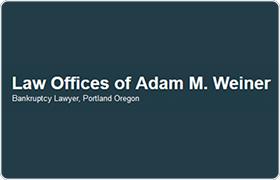Beaverton Bankruptcy & Debt Lawyer, Oregon
Sponsored Law Firm
-
 x
x

Click For More Info:
-
Law Offices of Adam M. Weiner
8624 SE 13th Ave Portland, OR 97202» view mapBankruptcy & Debt Premier Bankruptcy Attorney
Life doesn’t always have to be hard. Consult with a bankruptcy attorney who looks out for your best interests. Call today to begin the process for a fresh financial start.
503-719-5123
Collin C. McKean
✓ VERIFIEDEstate Planning, Bankruptcy, Personal Injury, Family Law, Federal Appellate Practice
We make solutions for our clients, helping them navigate difficult transitions.
Adam M. Weiner
✓ VERIFIEDBankruptcy & Debt, Credit & Debt, Collection
Adam Weiner has been practicing law in Oregon since May 1998. After successfully spending many years representing individuals in different types of... (more)
FREE CONSULTATION
CONTACTJacob David Braunstein
Credit & Debt, Criminal, Bankruptcy, Consumer Bankruptcy
Status: In Good Standing
Gail P Vore
Litigation, Estate Planning, Business & Trade, Bankruptcy
Status: In Good Standing Licensed: 36 Years
David Charles Clarke
Lawsuit & Dispute, Divorce & Family Law, Car Accident, Wills & Probate, Consumer Bankruptcy
Status: In Good Standing Licensed: 15 Years
FREE CONSULTATION
CONTACTScott Martin Hutchinson
Credit & Debt, Consumer Bankruptcy, Bankruptcy, Bankruptcy & Debt
Status: In Good Standing
John M Griffiths
Consumer Bankruptcy, Workout, Living Wills
Status: In Good Standing Licensed: 28 Years
Pamela E. Yee
Real Estate, Business Organization, Credit & Debt, Collection
Status: In Good Standing Licensed: 37 Years
 Adam M. Weiner Portland, OR
Adam M. Weiner Portland, OR Practice AreasExpertise
Practice AreasExpertise


